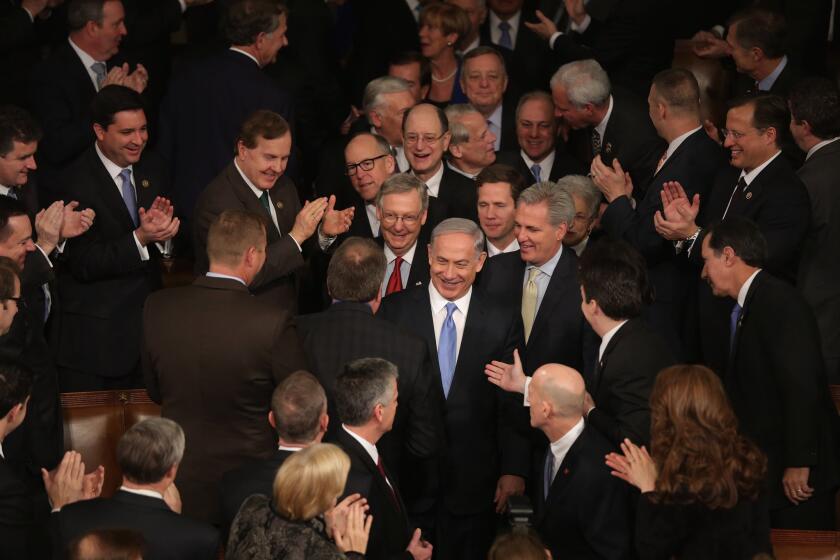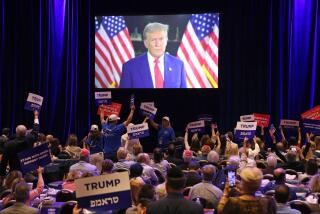Democrats split over boycotting Israeli prime minister’s address to Congress
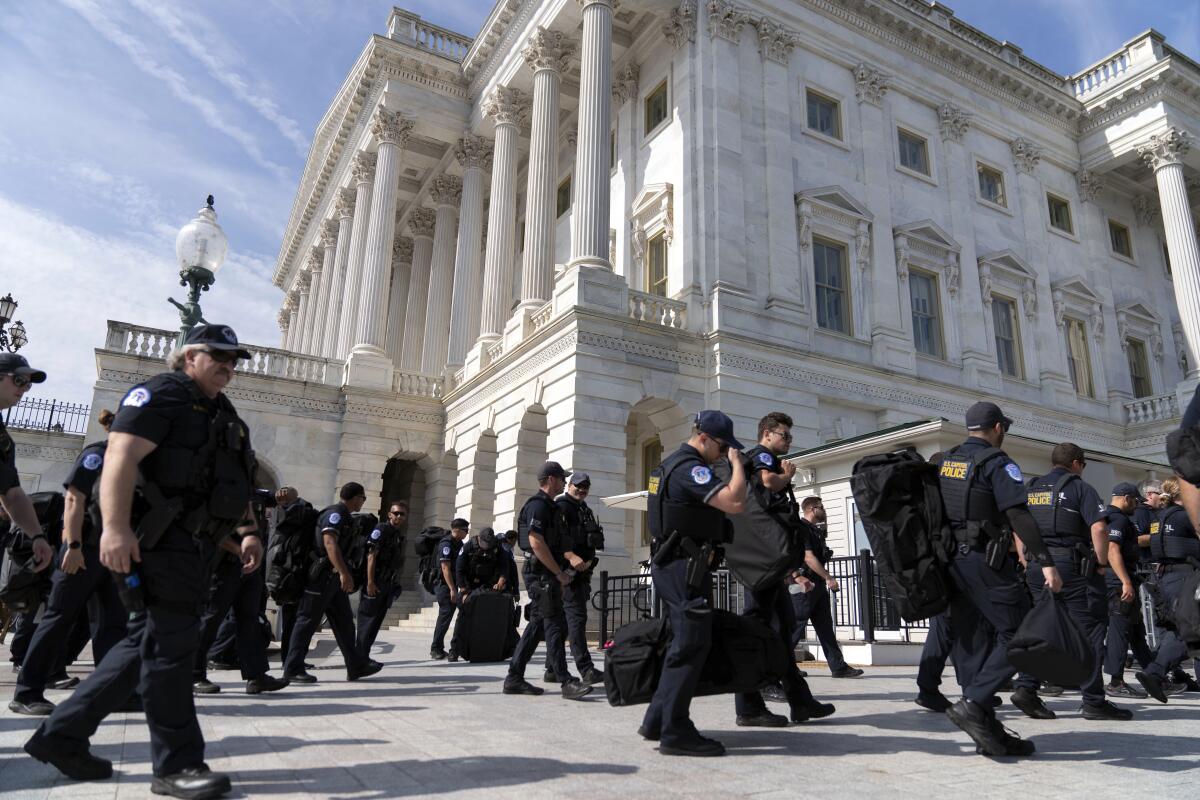
- Share via
WASHINGTON — At a time when Democrats are attempting to unify around a new presidential candidate, a foreign leader who divides them — and many Americans — has arrived in the nation’s capital.
Israeli Prime Minister Benjamin Netanyahu, one of the world’s most polarizing leaders, addressed Congress on Wednesday. He came to Washington at the invitation of Republican legislators, circumventing the White House, much as he did in 2015 to illustrate his scorn for then-President Obama.
If Netanyahu meant for this trip to heap similar ignominy on President Biden, whom the Israeli leader has falsely accused of holding up shipments of weapons, then he was upstaged by Biden’s momentous decision Sunday to leave the presidential race. How that changes Netanyahu’s game plan, and how the administration chooses to deal with his intrusion into U.S. politics, remains to be seen.
Disagreements over the endgame could doom the Israel-Hamas cease-fire deal if the warring sides aren’t willing to negotiate.
More than 50 Democrats were absent from the address, the Associated Press reported.
In liberal California, home to large and influential Jewish and Arab American communities, the Netanyahu visit sowed division in the congressional delegation. Reps. Mike Levin (D-San Juan Capistrano), Adam B. Schiff (D-Burbank), Pete Aguilar (D-Redlands), Ted Lieu (D-Torrance), Jimmy Gomez (D-Los Angeles), Salud Carbajal (D-Santa Barbara) and Brad Sherman (D-Sherman Oaks) were among the Californians in the audience.
California Sen. Alex Padilla also attended. Asked about his reasoning, he said: “I’m hoping there will be good news to report on progress toward a cease-fire.”
Carbajal issued a scathing statement afterward condemning Netanyahu’s “reckless rhetoric” that lacked acknowledgment of the thousands of civilian deaths in Gaza and saying his “bravado threatens to plunge his country and the region into larger and longer conflict.”
Many of the state’s Democrats, however, joined colleagues from around the country in boycotting the speech. Californians who skipped Netanyahu’s address included Reps. Nancy Pelosi (D-San Francisco), Barbara Lee (D-Oakland), Ami Bera (D-Elk Grove), Ro Khanna (D-Fremont) and Mark Takano (D-Riverside).
Vice President Kamala Harris, the all-but-certain Democratic presidential candidate, did not attend the speech but will hold a private meeting with Netanyahu on Thursday.
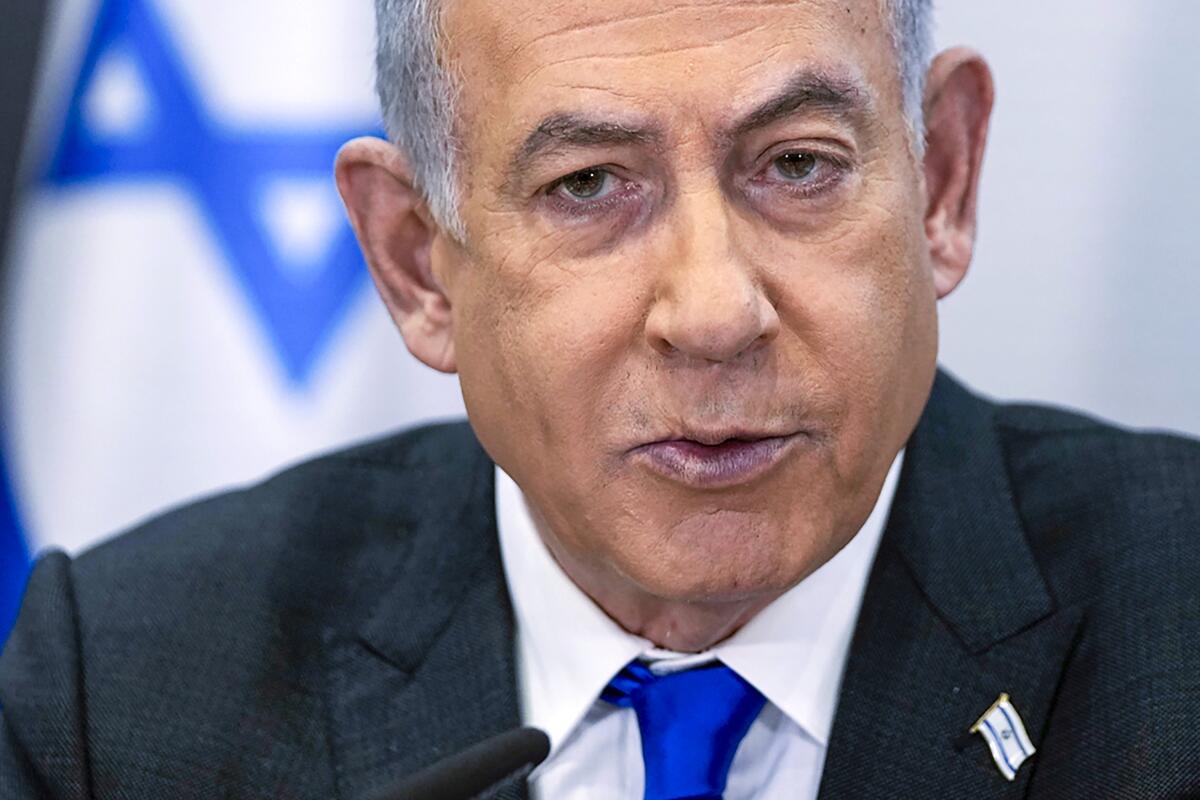
Netanyahu has come under blistering criticism for his handling of the war in the Gaza Strip, which began after the militant Palestinian group Hamas attacked southern Israel Oct. 7, killing around 1,200 people and seizing more than 250 hostages.
Since then, the Palestinian death toll in Israeli airstrikes, bombings and a ground invasion has surpassed 39,000, according to the Gaza Health Ministry, which does not specify how many of those are combatants and how many are civilians. There is widespread international agreement that large numbers are women and children.
Biden quickly offered unqualified support for Israel and Netanyahu in October, though as the war has dragged on he has publicly urged the right-wing Israeli government to take better care to avoid civilian casualties and to agree to a cease-fire deal that would also see the release of Israeli hostages still held by Hamas.
Still, Biden’s support for Israel cost him politically at home among key voter constituencies and abroad, where the U.S. is seen as complicit in what some governments argue is genocide in Gaza.
Washington annually gives Israel more than $3 billion in aid, ratcheting that figure up threefold since Oct. 7 with massive weapons supplies.
Netanyahu used the speech Wednesday to demand more aid and more weapons, without delay or holdups. Biden stopped a single shipment of 2,000-pound bombs this year as Israel was threatening to attack the southern Gaza city of Rafah, where about a million Palestinians were sheltering.

The issue has proved problematic for many Democratic members of Congress. Many draw a clear distinction between support for Israel and support for Netanyahu.
Ahead of Netanyahu’s speech, dozens of lawmakers met with Israeli citizens whose family members were kidnapped Oct. 7.
The Israeli visitors asked lawmakers not to let Netanyahu turn the humanitarian issue of the hostages into a political issue, and to focus on the Israeli and Palestinian families who are suffering.
For months, extremist Israeli group Tzav 9 has been blocking lifesaving aid meant for Palestinians struggling to survive in the war-torn Gaza Strip, U.S. officials say.
“Focusing on image rather than essence, Netanyahu believes it is more important to speak to the American Congress than to answer Israeli questions, which he avoids for months,” said Zahiro Shahar Mor, nephew of Avraham Munder, who was abducted on Oct. 7. “Rather than confronting the shocked and devastated citizens and press, he orchestrated a standing ovation speech thousands of miles away from where his responsibility actually lies.”
Takano, who participated in the event with Israeli families, said in a statement that he grappled for weeks with whether to attend the address before deciding not to.
He said he believes Republicans gave Netanyahu the platform to further sow division among members of Congress and accused the Israeli leader of prolonging the conflict, ignoring the pleas of his own citizens to focus on bringing home the remaining hostages and rebuffing concerns from the U.S. and other allies about the toll of the war on Palestinian civilians.
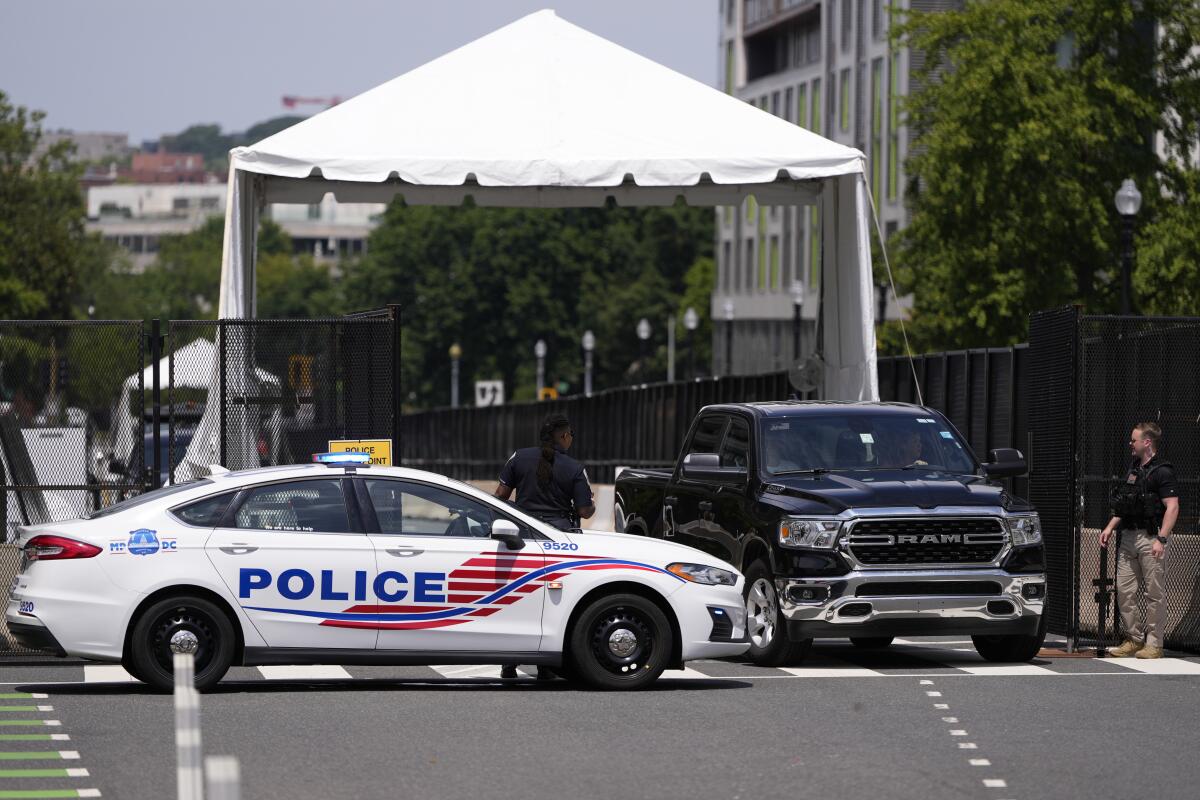
“In recent months, I’ve grown increasingly troubled by Mr. Netanyahu’s actions, which have sought to further his own political survival rather than securing the return of hostages and a much-needed ceasefire,” he wrote.
Levin has called for a change in Israeli leadership but nonetheless attended Netanyahu’s speech.
Levin is endorsed by the American Israeli Public Affairs Committee, an influential group that has launched campaigns across the U.S. to unseat candidates who are critical of Israel’s actions in the Israel-Hamas war.
“Israel is an important ally — I think it’s important that members of Congress attend,” Levin said. “Not necessarily in support of that leader of that nation, but rather in support of the people of that nation and of the important relationship that the Jewish Democratic state of Israel has with the United States.”
Netanyahu last spoke to Congress in 2015 amid a tense relationship with Obama. Vice presidents typically preside over joint addresses, but then-Vice President Joe Biden was traveling and didn’t attend.
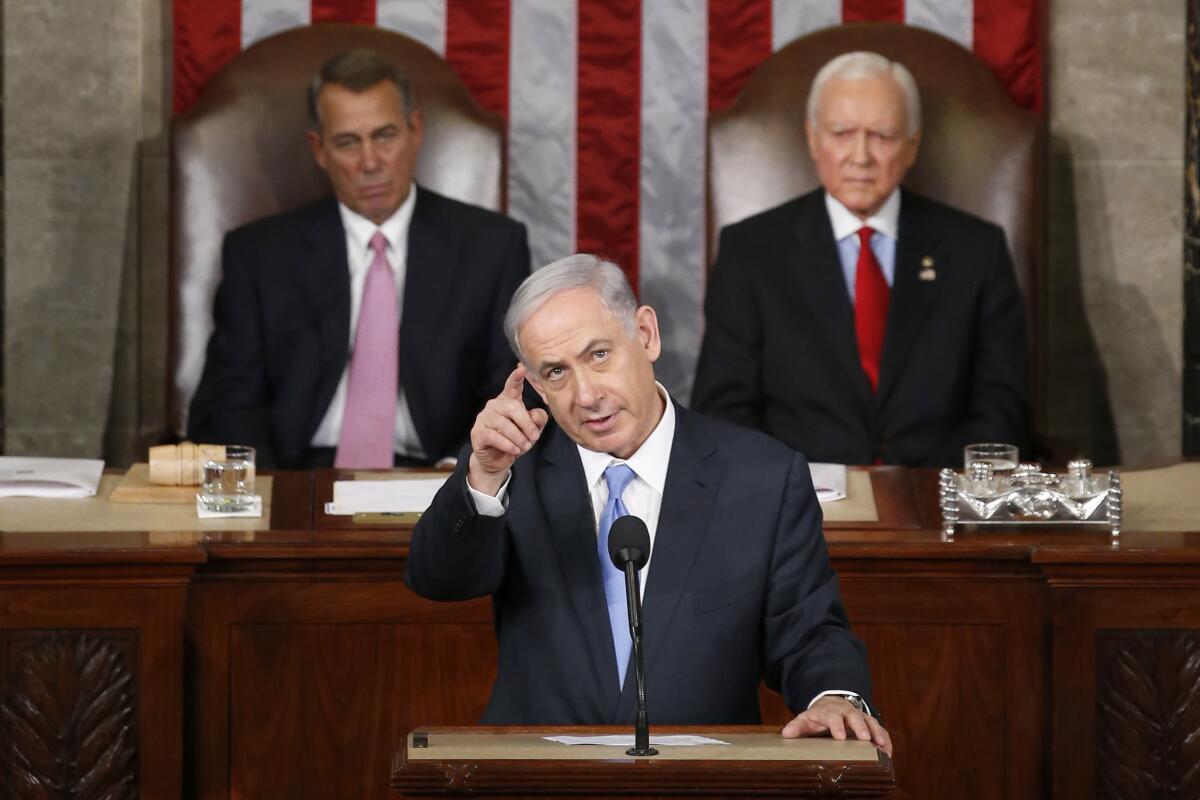
That time, the White House wasn’t alerted in advance that Congress had invited Netanyahu to speak, which the administration said was destructive to the relationship between the U.S. and Israel. It was part of Netanyahu’s long campaign to undermine decades of bipartisan U.S. support for Israel and make his policy aims an overtly Republican cause.
Soon after President Trump took office, he reversed decades of American policy by moving the U.S. Embassy from Tel Aviv to the disputed city of Jerusalem. He also recognized Israel’s claim to sovereignty over the Golan Heights, fertile land Israel seized from Syria, and said he approved of Jewish settlements on land claimed by the Palestinians in the West Bank. Most of the international community considers the settlements illegal.
Schiff said before the 2015 event that it was “unseemly” to invite a foreign head of state to speak against White House policy, but that he would be a “gracious host.”
Schiff’s office confirmed he would also attend Netanyahu’s address Wednesday, but did not make the congressman available for an interview.
Lee, who has called for an immediate cease-fire in Gaza, also attended the morning event with Israeli families.
She said she has been to the region at least a dozen times since the 1990s and knows the dynamics of Israeli settler violence against Palestinians and violence by Hamas and Hezbollah against Israelis. She said that personal history informed her decision not to attend Netanyahu’s address — just as in 2015 — which she views as “a thinly veiled GOP political event” while people continue dying in Gaza.
“It’s not like I’m seeing this in a way that’s naive,” Lee said. “I know what I’ve seen and I know that Netanyahyu has been counterproductive to the peace and security of the region.”
Bera said in a statement Tuesday that he decided “after listening to the family members of American hostages held captive by Hamas” — most of whom are bitterly angry at the prime minister — not to attend Netanyahu’s address. Bera urged Netanyahu to accept the cease-fire deal brokered by Biden.
Khanna told NBC last month that he wouldn’t attend.
“I said that if he wants to come to speak to members of Congress about how to end the war and release hostages, I would be fine doing that,” he said. “But I’m not going to sit in a one-way lecture.”
In 2015, dozens of members chose not to attend Netanyahu’s address in protest of how the speech had been politicized.
For a speech about which there was much controversy among Democrats, Prime Minister Benjamin Netanyahu’s first applause line was reserved for an unlikely recipient: Harry Reid, the top Senate Democrat, whom he praised for a quick recovery from a recent injury.
The protests this week over Netanyahu’s presence extend far beyond Congress. Thousands of Jewish and Arab Americans converged on the nation’s capital to make their voices heard — protesting Israel’s war in Gaza, challenging U.S. policy in the region and expressing anger over the welcoming of a prime minister who prosecutors at the International Criminal Court would like to arrest and charge with war crimes.
Across the nation’s capital at rallies big and small, most attendees had a unified message — stop the war in Gaza and free the hostages held by Hamas — punctuated by scorn for the guest of honor over in the Capitol Rotunda.
“We are running out of time!” Rabbi Josh Weinberg of New York, who represents the Union for Reform Judaism, said to several hundred people in a park a few blocks from the Capitol. He referred to the plight of the hostages, several of whose relatives were at the demonstration.
The crowd chanted: “The world has got to know, Netanyahu has got to go.”
More to Read
Get the L.A. Times Politics newsletter
Deeply reported insights into legislation, politics and policy from Sacramento, Washington and beyond. In your inbox three times per week.
You may occasionally receive promotional content from the Los Angeles Times.


